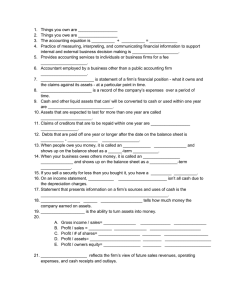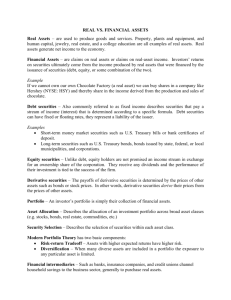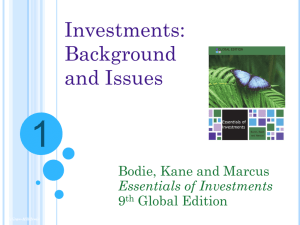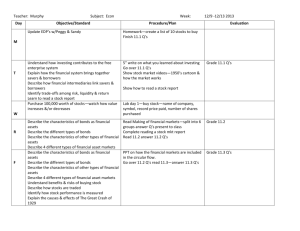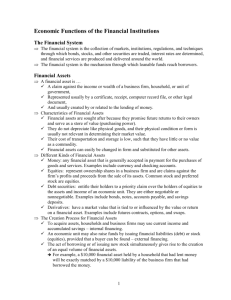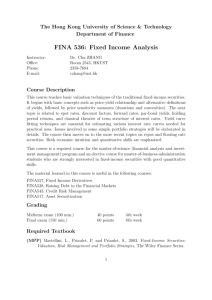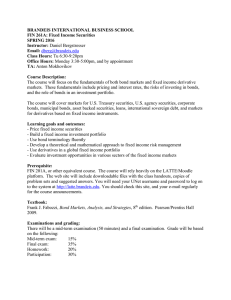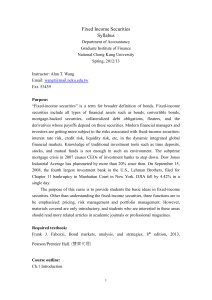Chap001_overview
advertisement
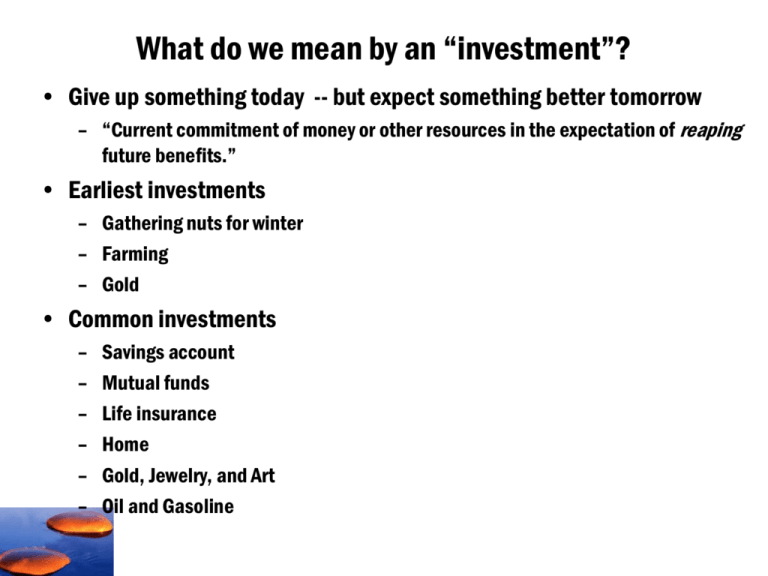
What do we mean by an “investment”? • Give up something today -- but expect something better tomorrow – “Current commitment of money or other resources in the expectation of reaping future benefits.” • Earliest investments – Gathering nuts for winter – Farming – Gold • Common investments – – – – – – Savings account Mutual funds Life insurance Home Gold, Jewelry, and Art Oil and Gasoline “Real Assets” versus “Financial Assets”? • Real Assets – Assets used to produce goods and services • Examples of Real Assets – – – – Inventions and patents “Goodwill” in financial statements Oil refineries and auto plants, equipment, computers Inventories • Financial Assets – Claims on real assets or income they generate – Examples → “Real Assets” versus “Financial Assets”? Examples of Financial Assets • Debt (or “Fixed Income”) – “Money market” instruments (< 1 year to maturity) • Bank certificates of deposit – “Capital market” instruments (1+ year to maturity) • Bonds • Common stock – “Listed” (IBM, GE, GM) – “Over-the-counter” (“penny” stocks) • Preferred stock • Derivative securities – Futures, options, swaps Real versus Financial Assets • All financial assets (owner of the claim) are offset by a financial liability (issuer of the claim). • When we aggregate over all balance sheets, only real assets remain. • Hence the net wealth of an economy is the sum of its real assets. 1-4 Financial Markets and the Economy 1-5 What do we mean by “allocation of capital”? - Financial markets allow for the “allocation of capital”. - Investor “capital” is the money they invest. - The money “allocated” to companies (or governments) determines their future. • Initial public offerings – Microsoft example – AT&T bonds example – Mortgage-backed securities example • Subsequent stock offerings – Corporations sometimes issue more of their own stock • Stock buybacks – Corporations sometimes by back some of their own stock • Financial markets: Prices are determined by buyers and sellers What do we mean by “shifting your consumption”? • Financial markets allow for “consumption shifting”. • “Consumption” means using something up – Example: spend $$ on food and gas. • “Shifting your consumption” means you don’t have to spend everything you earn today on things you will consume today. – Example: most people borrow money to get started (education, home) and then work and save, and then hope to retire and spend • What is the impact of inflation? – What if you save your money under your bed or in “risk-free” Treasury bills? – What happens if people can’t trust savings accounts or “safe” investments? Allocation of Risk o Investors can choose a desired risk level • Bonds versus stock of a given company • Bank CD versus company bond • Tradeoff between risk and return? 1-8 Financial Markets • Informational Role of Financial Markets o Do market prices equal the fair value estimate of a security’s expected future risky cash flows? o Can we rely on markets to allocate capital to the best uses? • What other mechanism could we use to allocate capital? • What would be the advantages and disadvantages of another system? 1-9 • Separation of Ownership and Management • Large size of firms requires separate principals and agents • Mitigating Factors • Performance-based compensation • Boards of directors may fire managers • Threat of takeovers • Corporate Governance and Corporate Ethics • Businesses and markets require trust to operate efficiently • Without trust additional laws and regulations are required • Laws and regulations are costly • Governance and ethics failures cost the economy billions, if not trillions • Eroding public support and confidence • Corporate Governance and Corporate Ethics • Accounting scandals • Enron, WorldCom, Rite-Aid, HealthSouth, Global Crossing, Qwest • Misleading research reports • Citicorp, Merrill Lynch, others • Auditors: Watchdogs or consultants? • Arthur Andersen and Enron • Corporate Governance and Corporate Ethics • Sarbanes-Oxley Act: • Requires more independent directors on company boards • Requires CFO to personally verify the financial statements • Created new oversight board for the accounting/audit industry • Charged board with maintaining a culture of high ethical standards The Investment Process o Asset allocation Choosing the percentage of funds in asset classes 60% Stocks 30% Bonds 6% Alternative Assets 4% Money market securities o Security selection & analysis Choosing specific securities w/in an asset class o The asset allocation decision is the primary determinant of a portfolio’s return 1-14 Markets Are Competitive o Risk-return trade-off: o Assets with higher expected returns have higher risk. Average Annual Return Stocks About 12% Minimum (1931) Maximum (1933) -46% 55% A stock portfolio can be expected to lose money about 1 out of every 4 years. o Bonds have a much lower average rate of return (under 6%) and have not lost more than 13% of their value in any one year. 1-15 Risk-Return Trade- Off o How do we measure risk? o How does diversification affect risk? o Discussed in Part 2 of the text 1-16 Efficient Markets o Market efficiency: o Securities should be neither underpriced nor overpriced on average o Security prices should reflect all information available to investors o Whether we believe markets are efficient affects our choice of appropriate investment management style. 1-17 Active vs. Passive Management Active Management (inefficient markets) Finding undervalued securities Security Selection Asset Allocation Timing the market Passive Management (efficient markets) No attempt to find undervalued securities • Indexing No attempt to time • Constructing an Holding a diversified portfolio: “efficient” portfolio 1-18 The Players 1-19 The Players • Business Firms – net borrowers • Households – net savers • Governments – can be both borrowers and savers • Financial Intermediaries “Connectors of borrowers and lenders” o Commercial Banks • Traditional line of business: Make loans funded by deposits o o o o Investment companies Insurance companies Pension funds Hedge funds 1-20 The Players Cont. • Investment Bankers o Firms that specialize in primary market transactions o Primary market: • A market where newly issued securities are offered to the public. • The investment banker typically ‘underwrites’ the issue. o Secondary market • A market where pre-existing securities are traded among investors. 1-21

